Workplace inclusion means building an environment where every employee feels respected and valued, which motivates them to do their best. So your inclusion strategies shouldn’t just be an afterthought.
It’s more than just bringing diverse people together. It’s also about fostering true belonging, which drives engagement, innovation, and success. Inclusive companies are equitable and more effective at dealing with change.
Performative statements are insufficient to express inclusiveness. Today’s candidates and employees demand that diversity and inclusion be part of a company’s operations. This blog explores strategies for creating a workplace where all employees feel welcome.
Inclusion Strategies for Hiring
Hiring Individuals with Criminal Records
Fair chance hiring provides significant advantages for both businesses and society. Companies can access a large pool of available talent (as many as 1 in 3 Americans have some type of criminal record). Employers may also qualify for the Work Opportunity Tax Credit (WOTC), offering up to $9,600 per hire or other financial incentives that compensate for the cost of hiring. Providing former inmates with jobs is the fastest way to achieve the desired rate of decline in crime, and thus, it is a real source of community stability and development.
Further, an Indeed survey showed that 96% of workers said they would prefer to work for an organization that uses fair chance hiring practices, while other research shows that fair chance hires are strong performers.
Ban the Box
The Ban the Box campaign encouraged companies to eliminate the checkbox asking applicants about previous criminal records to support fair hiring. The goal is to ensure that candidates are initially evaluated based on their abilities and work experience rather than their ex-convict past. Ban the Box has been adopted by over 35 states and 150 cities and counties. Target, Starbucks, and Walmart have implemented similar programs internally. Starbucks has even conducted background checks only after extending a conditional offer of employment.
Second Chance
Another initiative called the Second Chance normalizes hiring individuals with criminal records. It involves adjusting internal policies, investing in reentry programs, and educating hiring teams on inclusive practices. JPMorgan Chase, PepsiCo, and Verizon have publicly committed to this practice. JP Morgan eliminated questions about criminal records from initial job applications and worked with external partners on resume and career coaching services to help previously incarcerated job seekers.
Read full article here
Workplace inclusion means building an environment where every employee feels respected and valued, which motivates them to do their best.


1 Comment
Your point of view caught my eye and was very interesting. Thanks. I have a question for you.